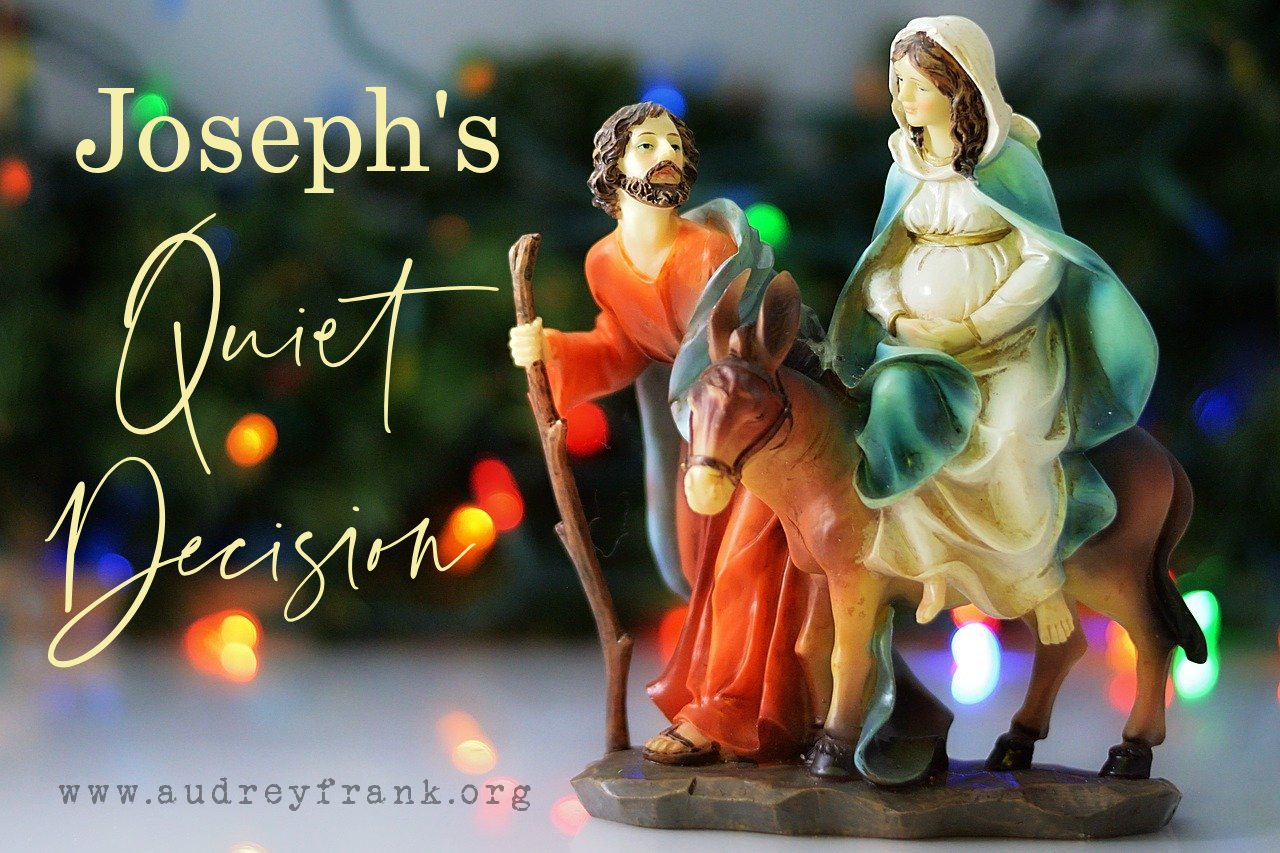Joseph’s Quiet Decision

Now the birth of Jesus Christ took place in this way. When his mother Mary had been betrothed to Joseph, before they came together she was found to be with child from the Holy Spirit. And her husband Joseph, being a just man and unwilling to put her to shame, resolved to divorce her quietly. But as he considered these things, the angel of the Lord appeared to him in a dream, saying, “Joseph, son of David, do not fear to take Mary as your wife, for that which is conceived in her is from the Holy Spirit. She will bear a son, and you shall call his name Jesus, for he will save his people from their sins.”
When Joseph woke from sleep, he did as the angel of the Lord commanded him: he took his wife, but knew her not until she had given birth to a son. And he called his name Jesus.
Matthew 1:18-21, 24-25
Joseph’s quiet decision was not what you might think.
Joseph was an honor guard. As a man in an honor-shame culture, it was his responsibility to avoid shame and protect honor. To be shamed would mean losing one’s position of belonging, being forced to become an outsider. In a community where group identity held greater value than individual identity, to be outcast would be devastating not just to yourself, but to your family, tribe, or nation.
Old Testament law commanded death to the betrothed virgin who committed adultery (see Leviticus 20:10, Deuteronomy 22:23-24). However, Joseph and Mary were living under Roman rule, and the Romans did not allow the execution of convicted persons without permission (such foreshadowing of the death their Son would die!) We can deduce from this that although Jewish law dictated death in Mary’s case, under Roman law she was more likely to face divorce and the ensuing cultural shame it would bring.
But shame, for those from that worldview, is a type of living death.
The humble carpenter faced an excruciating dilemma. How could he protect Mary, himself, and their families from the shame that would surely come when news spread his fiancée was pregnant?
In the Jewish context, betrothal was so binding that it required a certificate of divorce. If one of the betrothed died, the other would be considered a widow or widower, even though they had not yet officially married. Throughout the ancient world, law and custom actually required a man to divorce an unfaithful wife or fiancée.
Just man that he was, Joseph decided to do what was in his power to reduce the shame Mary would experience. He would divorce her quietly, meaning obtaining a certificate of divorce in front of two witnesses, avoiding the court, and denying himself the refund to which he was entitled under such circumstances.
That night, the Lord intervened through a dream and gave Joseph wisdom and instruction beyond himself.
Joseph, son of David, do not fear to take Mary as your wife, for that which is conceived in her is from the Holy Spirit. She will bear a son, and you shall call his name Jesus, for he will save his people from their sins (v.21).
In a startling act of obedience, Joseph obeyed, and took Mary as his wife.
What we who read this through western eyes might miss here is that in doing so, Joseph took up the burden of shame alongside his betrothed. He took up the burden of shame alongside the Son who would be his Savior.
Joseph’s quiet decision was to embrace shame for the sake of honor.
He chose to forego the easy path for the hard one. To exchange belonging for rejection and a life of being different in a culture where being part of the group equaled praise and acceptance. His decision might even mean trading safety for a life-threatening, dangerous existence for him and his whole family.
Many who choose to believe in Jesus are faced with the same dilemma yet today. Joseph’s quiet decision to obey is being repeated by courageous brothers and sisters throughout honor-shame cultures. The Savior is coming to them in dreams and they are rising from sleep, willing to bear shame to follow the One who gives lasting honor.
Am I willing to bear the shame of my culture to follow the Lord? Will I risk being outcast, misunderstood, judged by those who were not at my bedside when the angel spoke in the early morning hours? Do I have the courage to care for others the world rejects? Do I believe He who is the Truth, even as the world encourages me to find “my truth?”
Joseph’s quiet decision to obey is no longer quiet. It has become a shofar, calling to us across the ages this #Christmas, demanding action. #insteadofshamehonor Share on XWill we obey? Will we enter into the fellowship of our Savior’s sufferings?
I will, Lord. I believe Your word to me this Christmas. I will follow You, I will fellowship with your shame and suffering for me. Amen.

The Conversation
I wrote a poem a few years ago regarding another aspect of Joseph’s decision. In spite of the dream, he probably knew enough about the prophecy of the Messiah to know Nazareth would not be his birthplace. Still, he chose to accept Mary and the burden you discuss.
Little did Joseph know that a Roman emperor would issue an edict that would send the expectant parents down the road to Bethlehem and prophecy fulfilled.
I would love to read your poem, Raymond. If you are up to sharing, you can send it to me at audrey@audreyfrank.org. So deep, Joseph’s responsibility. He merits a closer look. Blessings to you today!